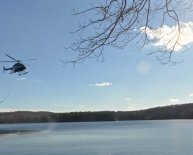
History of Environmental Protection
 "Natural Resource Conservation History in the Commonwealth and the Establishment
"Natural Resource Conservation History in the Commonwealth and the Establishment
of the Massachusetts Environmental Police"
Conservation Laws in 1600s
Massachusetts has had a long history of protecting its natural resources. Some of the earliest hunting and fishing laws date back to 1627 when the Colony of New Plymouth created a law that declared hunting, fowling, and fishing shall be free2. The Massachusetts Bay Colony also declared hunting and fishing to be free in 1641.
“Every inhabitant who is an house-holder shall have free fishing and fowling in any great ponds, bays, coves, and rivers so far as the sea ebbs and flows within the precinct of the town where they dwell unless the freeman of the same town or general court have otherwise appropriated them1.”
The colony also created many laws that paid bounties for killing wolves. In 1630, the Colony created a law that paid one schilling to any colonist who killed a wolf. In 1640, the Massachusetts Bay Colony passed a law which gave forty schillings to any man who killed a wolf with hounds. Many colonists hunted wolves because forty schillings was a sizeable bounty in 1640. The 1640 bounty was equivalent to twenty seven days of a laborers pay6.
“[E]arly Massachusetts laws encouraged residents to keep dogs, such as mastiffs and greyhounds, to use in hunting wolves and authorized town governments to use public funds to purchase and keep wolf-hunting dogs. Towns were also required to set out and bait specific numbers of wolf traps. Any town that neglected its obligation to trap wolves was assessed a fine6.”
 Map reproduction courtesy of the Norman B. Leventhal Map Center at the Boston Public Library
Map reproduction courtesy of the Norman B. Leventhal Map Center at the Boston Public Library
In 1636, a law was created which stated that no guns or iron traps could be used near the highway4. During the colonial period, alewives were a very important fish used for food and fertilizer. Plymouth colony created some of the country’s earliest fishing regulations to protect the alewives. In 1645, the colony created a law that prohibited the use of nets to catch alewives in the Sandwich river with a fine of ten pounds. In 1661, the Plymouth Colony banned any foreigner without permission from fishing on Cape Cod. In 1668, to protect cod, haddock, and pollock during spawning the Massachusetts Bay Colony banned all fishing in December and January. Fishing of mackerel was also banned in May and June. The penalty for fishing during the spawning period was 5 schillings per barrel.
In 1670, the position of Water Bailiff was created to regulate the Cape Cod Fisheries. Thomas Paine was appointed as the first Water Bailiff. The law required residents of the colony to pay a duty of six pence per barrel of mackerel caught. The duty on mackerel caught by foreigners was one schilling and 6 pence per barrel3.
Water Bailiff Oath
 “You shall faithfully serve in the office of Water Bailiff in the Jurisdiction of New Plymouth and shall carefully observe such orders of Court as concerns your said office with special reference unto the improvement thereof at Cape Cod and places adjacent. You shall faithfully discharge the trust imposed upon you in demanding and receiving whatsoever shall be due unto the Colony by such fish as shall be there taken; and shall seasonably give in a true account thereof unto the Treasurer yearly3.”
“You shall faithfully serve in the office of Water Bailiff in the Jurisdiction of New Plymouth and shall carefully observe such orders of Court as concerns your said office with special reference unto the improvement thereof at Cape Cod and places adjacent. You shall faithfully discharge the trust imposed upon you in demanding and receiving whatsoever shall be due unto the Colony by such fish as shall be there taken; and shall seasonably give in a true account thereof unto the Treasurer yearly3.”
In 1672, a new law was created which gave the Water Bailiff authority to seize any fish caught by a vessel in Cape Cod Bay that did not pay its duty.
“It is enacted by the Court that if any person or person that shall at any time hereafter ship or load on board any fish, caught at Cape Cod but such as he or they shall give an account of to the water bailiff: All such fish shall be forfeited to the colony’s use. The water bailiff is herby empowered to make seizure of all such fish as shall at any time become forfeit and is to give account thereof to the Treasurer or such as shall be appointed by the magistrates or any four of them to take the said account2.”
In 1673, a law passed which said that all profits from the Cape Cod fishery would be used to fund a public school. In 1684, the taking of mackerel ashore with seines or nets was prohibited under the forfeiture of the seines nets vessels and boats employed. The forfeitures were to be divided between the informer and the colony. Magistrates were authorized to issue warrants to persons empowering them as water bailiffs to make such seizures5.The Massachusetts Bay Colony (situated around present day Boston and Salem) and the Colony of New Plymouth (situated around present day Barnstable County, Plymouth county and Bristol county) unified in 1692 to form the Province of Massachusetts Bay. In 1693, deer hunting was prohibited between January 1st to July 1st. The first offense forty schillings, second offense three pounds, third offense five pounds. In 1710, a law was passed that banned the hunting of waterfowl from any boat, canoe, float, raft, or vessel. The penalty for breaking the law was a fine of forty schillings and a three year prohibition from hunting any waterfowl7. In 1727, the law was revised to include the prohibition of hunting waterfowl at night. The penalty from the crime was split between the person reporting the crime and the poor.
In 1717, to increase the deer population, a law was passed which prohibited any killing of bucks, does, and fawns until August 1st, 1721.
“Whereas the depth of snow in some late winters hath been so great as hath occasioned the destruction of a great part of the deer in this province; to the intent that the said creature (which is both harmless and profitable) may be preserved and increased8”.






















